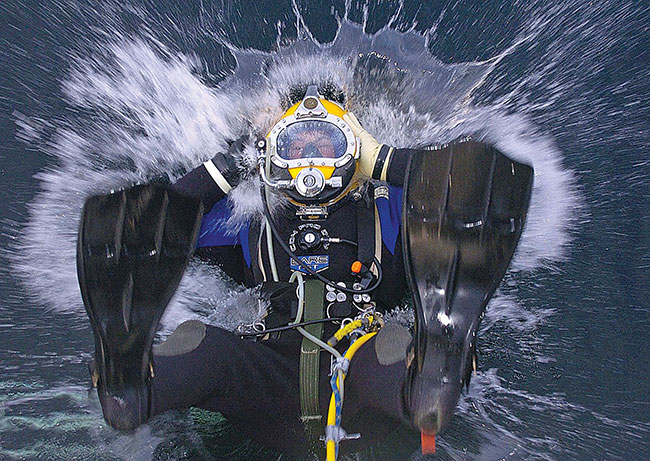
Help Wanted: Divers in demand
May 27, 2020
By Kelly Korol
Having enough divers in aquaculture will reduce the pressure on the current crop of divers and make it safer for everyone. Seafood farmers can do something to help expand the talent pool, writes Kelly Korol.
 Divers have
always been in short supply because diving as a career does not get much exposure
Divers have
always been in short supply because diving as a career does not get much exposure One of the more specialized jobs on the aquaculture site is the diver. Divers are required on most aquaculture sites for maintenance, repair and inspection on virtually everything under the surface, where the product is. Divers are the “eyes and hands” of the site manager in maintaining the security, health and welfare of the stock from the underwater perspective. Unfortunately, divers are in short supply as they require a unique set of skills and desire to work in a position most people may not want. As a result, there is a huge demand for divers in the global aquaculture market.
Divers have always been in short supply and the major reason is that it is a skilled trade that doesn’t get much exposure. High-school students leaning towards the trades are exposed to opportunities in electrical, plumbing, mechanics and welding but rarely consider diving as a lucrative career. Prospective divers usually stumble into diving as a career by word of mouth; some were inspired by the occasional television clip; while others are scuba divers who see it as a chance to get paid doing what they love. Then they do their research, find a dive school and if they can afford the gear and tuition, they give it a try.
The other thing that creates demand for new divers is turnover. Many divers graduate from school and go into aquaculture diving only to hang up their fins after a year or two and move on to another career. No doubt, diving as an occupation has a high attrition rate. Some hardy souls stay on and work their way up to supervisory positions, still diving and taking on responsibility for the dive team. Either way, this creates a constant demand for fresh divers to come into the industry and give it a go. With expansion of the aquaculture industry in all sectors, the demand for divers is outpacing the rate dive schools can produce graduates.
The dive industry has pretty well vanquished decompression sickness through education; however, the pressure to get the job done at all costs has caused some divers to push the limits as seen by a couple of recent major decompression sickness incidents on the east coast of Canada. The root cause of these incidents is the shortage of divers and the pressure to push the divers past their limits.
Although, there has been a concerted effort to reduce the need for divers on the aquaculture site, there will always be a need for a skilled set of eyes and hands in rigging and maintenance work on a water-based site. The solution is to get more divers into the industry. Like it or not, aquaculture will always need divers and should therefore consider cultivating a stronger workforce in this area.
Aquaculture companies need to get the word out to the youth coming through our high schools that diving is an exciting, well-paid career and overall very safe. At career fairs and public events aquaculture companies should emphasize the role of divers as part of the site team and recruit for these positions as well as the other site-specific careers. The skills needed to be a diver are one part training, one part work ethic and one part love of the outdoors so it is within the reach of many people. If we all work at getting the word out, we can take the pressure off the contractors and existing divers, making the industry safer and more profitable.
(Note: Divesafe International has created an online learning program at www.divesafe.com in response to the pandemic. )
Advertisement
- ‘Experiential learning’ not just a buzzword at Fleming
- Ugly fish fits bill for sustainable aquaculture





